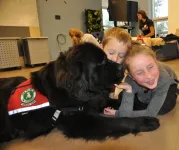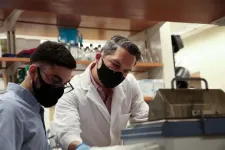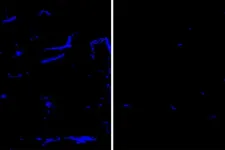(Press-News.org) Understanding the molecular biology of brain tumors is key to prognosis and treatment said Le Bonheur Neuroscience Institute Co-Director Frederick Boop, MD, in his presentation "How Molecular Biology Impacts Clinical Practice" at the International Society for Pediatric Neurosurgery (ISPN) 2020 Virtual Meeting.
"Historically we have depended on what we see under a microscope to differentiate tumor types and determine prognosis and therapy," said Boop. "We know now that what we see doesn't necessarily predict how these tumors are going to behave."
Physicians are able to send a piece of a child's tumor to FoundationOne, an FDA-approved tissue-based broad companion diagnostic (CDx) for solid tumors, which provides the genomic alterations of that particular tumor. This explanation of the genetic aberrations includes its significance, best available treatment with mechanism of action and studies open for enrollment.
Manipulation of tumors based on molecular genetics began more than 35 years ago with shrinking prolactinomas before turning to neurosurgery. Boop and his team now use a molecular biological approach with medulloblastomas, low-grade gliomas, congenital glioblastomas and many more types of brain tumors. Closer study of molecular genetics has revealed different variants within each type of tumor, each with a different treatment approach and prognosis based on the genetic variant. Further study is needed into treatment side effects and long-term consequences for some of these therapies.
"As neurosurgeons, it is important for us to get tissue to the lab in every instance for us to understand what's going on so that these children can have a chance," said Boop.
For tumors that can't be removed surgically but tissue is needed for diagnostics, biopsies provide better understanding and treatment of the tumor. Previously, neurosurgeons avoided these biopsies because it was believed that the cells required were closest to necrotic areas that could cause catastrophic complications. Better understanding of tumors means that the tumor can be biopsied in a safer area in order to obtain the molecular profile of the tumor.
"Molecular genetics has completed changed our field and will continue to do so," said Boop. "There may come a time when the role for surgeons is much less than it is today."
INFORMATION:
View Boop's full presentation here.
About Le Bonheur Children's:
Le Bonheur Children's Hospital in Memphis, Tenn., treats children through community programs, regional clinics and a 255-bed state-of-the-art hospital. Le Bonheur serves as a primary teaching affiliate for the University Tennessee Health Science Center and trains more than 350 pediatricians and specialists each year. Nationally recognized, Le Bonheur is ranked by U.S. News & World Report as a Best Children's Hospital.
For more information, please call (901) 287-6030 or visit lebonheur.org.
Connect with us at facebook.com/lebonheurchildrens, twitter.com/lebonheurchild or on Instagram at lebonheurchildrens.
About University of Tennessee Health Science Center:
As Tennessee's only public, statewide, academic health system, the mission of the University of Tennessee Health Science Center is to bring the benefits of the health sciences to the achievement and maintenance of human health through education, research, clinical care, and public service, with a focus on the citizens of Tennessee and the region. The main campus in Memphis includes six colleges: Dentistry, Graduate Health Sciences, Health Professions, Medicine, Nursing and Pharmacy. UTHSC also educates and trains medicine, pharmacy, and/or health professions students, as well as medical residents and fellows, at major sites in Knoxville, Chattanooga and Nashville.
For more information, visit http://www.uthsc.edu. Find us on Facebook: facebook.com/uthsc, on Twitter: twitter.com/uthsc and on Instagram: instagram.com/uthsc.
- END -
A new UBC Okanagan study finds children not only reap the benefits of working with therapy dogs-they enjoy it too.
"Dog lovers often have an assumption that canine-assisted interventions are going to be effective because other people are going to love dogs," says Nicole Harris, who conducted this research while a master's student in the School of Education. "While we do frequently see children improve in therapy dog programs, we didn't have data to support that they enjoyed the time as well."
Harris was the lead researcher in the study that explored how children reacted while participating in a social skill-training program with therapy dogs.
The research saw 22 children from the Okanagan Boys and Girls ...
Resistance to tangle formation may help preserve memory
SuperAgers have fewer tangles than normally aging individuals
Future research to see how SuperAgers are protected
CHICAGO - A new Northwestern Medicine study showed cognitive SuperAgers have resistance to the development of fibrous tangles in a brain region related to memory and which are known to be markers of Alzheimer's disease.
The tangles are made of the tau protein which forms structures that transport nutrients within the nerve cell. These tangles disrupt the cell's transport system, ...
Nearly a half-million people a year die from sudden cardiac death (SCD) in the U.S. -- the result of malfunctions in the heart's electrical system.
A leading cause of SCD in young athletes is arrhythmogenic cardiomyopathy (ACM), a genetic disease in which healthy heart muscle is replaced over time by scar tissue (fibrosis) and fat.
Stephen Chelko, an assistant professor of biomedical sciences at the Florida State University College of Medicine, has developed a better understanding of the pathological characteristics behind the disease, as well as promising avenues for ...
The trial found that using sensor-based asthma inhalers may improve control of the condition and improve the quality of life for caregivers.
Greatest gains were among non-Hispanic Black participants, who experience more frequent and severe asthma than other groups.
Based on the study results, this asthma intervention should be considered for use by primary care, allergy and pulmonary care providers, to help engage diverse populations of pediatric asthma patients and their caregivers.
CHICAGO (February 17, 2021) -- Sensor-based inhalers integrated into health care providers' clinical workflows may help improve medication adherence and support children with asthma - and their families - to more effectively manage this condition, according ...
Numerous studies have shown that trained dogs can detect many kinds of disease -- including lung, breast, ovarian, bladder, and prostate cancers, and possibly Covid-19 -- simply through smell. In some cases, involving prostate cancer for example, the dogs had a 99 percent success rate in detecting the disease by sniffing patients' urine samples.
But it takes time to train such dogs, and their availability and time is limited. Scientists have been hunting for ways of automating the amazing olfactory capabilities of the canine nose and brain, in a compact device. Now, a team of researchers at MIT and other institutions has come up with a system that can detect the chemical and microbial content of an air sample with ...
As people age, a normal brain protein known as amyloid beta often starts to collect into harmful amyloid plaques in the brain. Such plaques can be the first step on the path to Alzheimer's dementia. When they form around blood vessels in the brain, a condition known as cerebral amyloid angiopathy, the plaques also raise the risk of strokes.
Several antibodies that target amyloid plaques have been studied as experimental treatments for Alzheimer's disease. Such antibodies also may have the potential to treat cerebral amyloid angiopathy, although they haven't yet been evaluated in clinical trials. ...
An international team led by researchers at the Centre for Palaeogenetics in Stockholm has sequenced DNA recovered from mammoth remains that are up to 1.2 million years old. The analyses show that the Columbian mammoth that inhabited North America during the last ice age was a hybrid between the woolly mammoth and a previously unknown genetic lineage of mammoth. In addition, the study provides new insights into when and how fast mammoths became adapted to cold climate. These findings are published today in Nature.
Around one million years ago there were no woolly or Columbian mammoths, as they had not yet evolved. This was the time of their predecessor, the ...
DURHAM, N.C. -- A new pair of studies from a Duke research team's long-term work in New Zealand make the case that mental health struggles in early life can lead to poorer physical health and advanced aging in adulthood.
But because mental health problems peak early in life and can be identified, the researchers say that more investment in prompt mental health care could be used to prevent later diseases and lower societal healthcare costs.
"The same people who experience psychiatric conditions when they are young go on to experience excess age-related physical diseases and neurodegenerative diseases when they are older adults," explained Terrie Moffitt, the Nannerl O. Keohane professor ...
A University of Sydney-led international team of scientists has revealed the shape of one of the most important molecular machines in our cellsthe glutamate transporter, helping to explain how our brain cells communicate with one another.
Glutamate transporters are tiny proteins on the surface of all our cells that shut on and off the chemical signals that have a big role in making sure all cell-to-cell talk runs smoothly. They are also involved in nerve signalling, metabolism and learning and memory.
The researchers captured the transporters in exquisite detail using cryogenic electron microscopy (cryo-EM), showing they look like a 'twisted elevator' embedded in the cell membrane.
This world-first discovery ...
Almost one in five people lacks the protein α-actinin-3 in their muscle fibre. Researchers at Karolinska Institutet in Sweden now show that more of the skeletal muscle of these individuals comprises slow-twitch muscle fibres, which are more durable and energy-efficient and provide better tolerance to low temperatures than fast-twitch muscle fibres. The results are published in the scientific journal The American Journal of Human Genetics.
Skeletal muscle comprises fast-twitch (white) fibres that fatigue quickly and slow-twitch (red) fibres that are more resistant to fatigue. The protein α-actinin-3, which is found only ...



